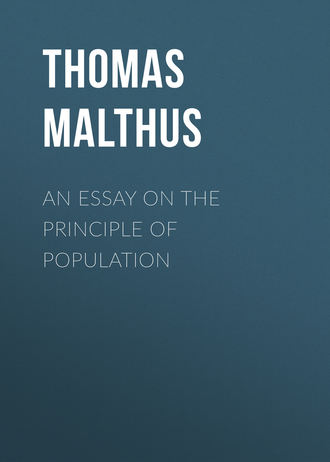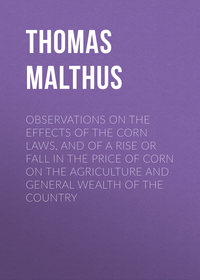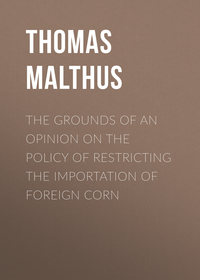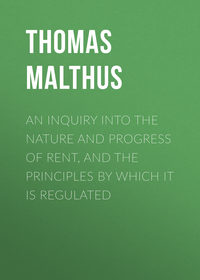 полная версия
полная версияAn Essay on the Principle of Population
No human institutions here existed, to the perverseness of which Mr Godwin ascribes the original sin of the worst men. (Bk VIII, ch. 3; in the third edition, Vol. II, p. 462) No opposition had been produced by them between public and private good. No monopoly had been created of those advantages which reason directs to be left in common. No man had been goaded to the breach of order by unjust laws. Benevolence had established her reign in all hearts: and yet in so short a period as within fifty years, violence, oppression, falsehood, misery, every hateful vice, and every form of distress, which degrade and sadden the present state of society, seem to have been generated by the most imperious circumstances, by laws inherent in the nature of man, and absolutely independent of it human regulations.
If we are not yet too well convinced of the reality of this melancholy picture, let us but look for a moment into the next period of twenty-five years; and we shall see twenty-eight millions of human beings without the means of support; and before the conclusion of the first century, the population would be one hundred and twelve millions, and the food only sufficient for thirty-five millions, leaving seventy-seven millions unprovided for. In these ages want would be indeed triumphant, and rapine and murder must reign at large: and yet all this time we are supposing the produce of the earth absolutely unlimited, and the yearly increase greater than the boldest speculator can imagine.
This is undoubtedly a very different view of the difficulty arising from population from that which Mr Godwin gives, when he says, 'Myriads of centuries of still increasing population may pass away, and the earth be still found sufficient for the subsistence of its inhabitants.'
I am sufficiently aware that the redundant twenty-eight millions, or seventy-seven millions, that I have mentioned, could never have existed. It is a perfectly just observation of Mr Godwin, that, 'There is a principle in human society, by which population is perpetually kept down to the level of the means of subsistence.' The sole question is, what is this principle? is it some obscure and occult cause? Is it some mysterious interference of heaven which, at a certain period, strikes the men with impotence, and the women with barrenness? Or is it a cause, open to our researches, within our view, a cause, which has constantly been observed to operate, though with varied force, in every state in which man has been placed? Is it not a degree of misery, the necessary and inevitable result of the laws of nature, which human institutions, so far from aggravating, have tended considerably to mitigate, though they never can remove?
It may be curious to observe, in the case that we have been supposing, how some of the laws which at present govern civilized society, would be successively dictated by the most imperious necessity. As man, according to Mr Godwin, is the creature of the impressions to which he is subject, the goadings of want could not continue long, before some violations of public or private stock would necessarily take place. As these violations increased in number and extent, the more active and comprehensive intellects of the society would soon perceive, that while population was fast increasing, the yearly produce of the country would shortly begin to diminish. The urgency of the case would suggest the necessity of some mediate measures to be taken for the general safety. Some kind of convention would then be called, and the dangerous situation of the country stated in the strongest terms. It would be observed, that while they lived in the midst of plenty, it was of little consequence who laboured the least, or who possessed the least, as every man was perfectly willing and ready to supply the wants of his neighbour. But that the question was no longer whether one man should give to another that which he did not use himself, but whether he should give to his neighbour the food which was absolutely necessary to his own existence. It would be represented, that the number of those that were in want very greatly exceeded the number and means of those who should supply them; that these pressing wants, which from the state of the produce of the country could not all be gratified, had occasioned some flagrant violations of justice; that these violations had already checked the increase of food, and would, if they were not by some means or other prevented, throw the whole community in confusion; that imperious necessity seemed to dictate that a yearly increase of produce should, if possible, be obtained at all events; that in order to effect this first, great, and indispensable purpose, it would be advisable to make a more complete division of land, and to secure every man's stock against violation by the most powerful sanctions, even by death itself.
It might be urged perhaps by some objectors that, as the fertility of the land increased, and various accidents occurred, the share of some men might be much more than sufficient for their support, and that when the reign of self-love was once established, they would not distribute their surplus produce without some compensation in return. It would be observed, in answer, that this was an inconvenience greatly to be lamented; but that it was an evil which bore no comparison to the black train of distresses that would inevitably be occasioned by the insecurity of property; that the quantity of food which one man could consume was necessarily limited by the narrow capacity of the human stomach; that it was not certainly probable that he should throw away the rest; but that even if he exchanged his surplus food for the labour of others, and made them in some degree dependent on him, this would still be better than that these others should absolutely starve.
It seems highly probable, therefore, that an administration of property, not very different from that which prevails in civilized states at present, would be established, as the best, though inadequate, remedy for the evils which were pressing on the society.
The next subject that would come under discussion, intimately connected with the preceding, is the commerce between the sexes. It would be urged by those who had turned their attention to the true cause of the difficulties under which the community laboured, that while every man felt secure that all his children would be well provided for by general benevolence, the powers of the earth would be absolutely inadequate to produce food for the population which would inevitably ensue; that even if the whole attention and labour of the society were directed to this sole point, and if, by the most perfect security of property, and every other encouragement that could be thought of, the greatest possible increase of produce were yearly obtained; yet still, that the increase of food would by no means keep pace with the much more rapid increase of population; that some check to population therefore was imperiously called for; that the most natural and obvious check seemed to be to make every man provide for his own children; that this would operate in some respect as a measure and guide in the increase of population, as it might be expected that no man would bring beings into the world, for whom he could not find the means of support; that where this notwithstanding was the case, it seemed necessary, for the example of others, that the disgrace and inconvenience attending such a conduct should fall upon the individual, who had thus inconsiderately plunged himself and innocent children in misery and want.
The institution of marriage, or at least, of some express or implied obligation on every man to support his own children, seems to be the natural result of these reasonings in a community under the difficulties that we have supposed.
The view of these difficulties presents us with a very natural origin of the superior disgrace which attends a breach of chastity in the woman than in the man. It could not be expected that women should have resources sufficient to support their own children. When therefore a woman was connected with a man, who had entered into no compact to maintain her children, and, aware of the inconveniences that he might bring upon himself, had deserted her, these children must necessarily fall for support upon the society, or starve. And to prevent the frequent recurrence of such an inconvenience, as it would be highly unjust to punish so natural a fault by personal restraint or infliction, the men might agree to punish it with disgrace. The offence is besides more obvious and conspicuous in the woman, and less liable to any mistake. The father of a child may not always be known, but the same uncertainty cannot easily exist with regard to the mother. Where the evidence of the offence was most complete, and the inconvenience to the society at the same time the greatest, there it was agreed that the large share of blame should fall. The obligation on every man to maintain his children, the society would enforce, if there were occasion; and the greater degree of inconvenience or labour, to which a family would necessarily subject him, added to some portion of disgrace which every human being must incur who leads another into unhappiness, might be considered as a sufficient punishment for the man.
That a woman should at present be almost driven from society for an offence which men commit nearly with impunity, seems to be undoubtedly a breach of natural justice. But the origin of the custom, as the most obvious and effectual method of preventing the frequent recurrence of a serious inconvenience to a community, appears to be natural, though not perhaps perfectly justifiable. This origin, however, is now lost in the new train of ideas which the custom has since generated. What at first might be dictated by state necessity is now supported by female delicacy, and operates with the greatest force on that part of society where, if the original intention of the custom were preserved, there is the least real occasion for it.
When these two fundamental laws of society, the security of property, and the institution of marriage, were once established, inequality of conditions must necessarily follow. Those who were born after the division of property would come into a world already possessed. If their parents, from having too large a family, could not give them sufficient for their support, what are they to do in a world where everything is appropriated? We have seen the fatal effects that would result to a society, if every man had a valid claim to an equal share of the produce of the earth. The members of a family which was grown too large for the original division of land appropriated to it could not then demand a part of the surplus produce of others, as a debt of justice. It has appeared, that from the inevitable laws of our nature some human beings must suffer from want. These are the unhappy persons who, in the great lottery of life, have drawn a blank. The number of these claimants would soon exceed the ability of the surplus produce to supply. Moral merit is a very difficult distinguishing criterion, except in extreme cases. The owners of surplus produce would in general seek some more obvious mark of distinction. And it seems both natural and just that, except upon particular occasions, their choice should fall upon those who were able, and professed themselves willing, to exert their strength in procuring a further surplus produce; and thus at once benefiting the community, and enabling these proprietors to afford assistance to greater numbers. All who were in want of food would be urged by imperious necessity to offer their labour in exchange for this article so absolutely essential to existence. The fund appropriated to the maintenance of labour would be the aggregate quantity of food possessed by the owners of land beyond their own consumption. When the demands upon this fund were great and numerous, it would naturally be divided in very small shares. Labour would be ill paid. Men would offer to work for a bare subsistence, and the rearing of families would be checked by sickness and misery. On the contrary, when this fund was increasing fast, when it was great in proportion to the number of claimants, it would be divided in much larger shares. No man would exchange his labour without receiving an ample quantity of food in return. Labourers would live in ease and comfort, and would consequently be able to rear a numerous and vigorous offspring.
On the state of this fund, the happiness, or the degree of misery, prevailing among the lower classes of people in every known state at present chiefly depends. And on this happiness, or degree of misery, depends the increase, stationariness, or decrease of population.
And thus it appears, that a society constituted according to the most beautiful form that imagination can conceive, with benevolence for its moving principle, instead of self-love, and with every evil disposition in all its members corrected by reason and not force, would, from the inevitable laws of nature, and not from any original depravity of man, in a very short period degenerate into a society constructed upon a plan not essentially different from that which prevails in every known state at present; I mean, a society divided into a class of proprietors, and a class of labourers, and with self-love the main-spring of the great machine.
In the supposition I have made, I have undoubtedly taken the increase of population smaller, and the increase of produce greater, than they really would be. No reason can be assigned why, under the circumstances I have supposed, population should not increase faster than in any known instance. If then we were to take the period of doubling at fifteen years, instead of twenty-five years, and reflect upon the labour necessary to double the produce in so short a time, even if we allow it possible, we may venture to pronounce with certainty that if Mr Godwin's system of society was established in its utmost perfection, instead of myriads of centuries, not thirty years could elapse before its utter destruction from the simple principle of population.
I have taken no notice of emigration for obvious reasons. If such societies were instituted in other parts of Europe, these countries would be under the same difficulties with regard to population, and could admit no fresh members into their bosoms. If this beautiful society were confined to this island, it must have degenerated strangely from its original purity, and administer but a very small portion of the happiness it proposed; in short, its essential principle must be completely destroyed, before any of its members would voluntarily consent to leave it, and live under such governments as at present exist in Europe, or submit to the extreme hardships of first settlers in new regions. We well know, from repeated experience, how much misery and hardship men will undergo in their own country, before they can determine to desert it; and how often the most tempting proposals of embarking for new settlements have been rejected by people who appeared to be almost starving.
CHAPTER 11
Mr Godwin's conjecture concerning the future extinction of the passion between the sexes—Little apparent grounds for such a conjecture—Passion of love not inconsistent either with reason or virtue.
We have supported Mr Godwin's system of society once completely established. But it is supposing an impossibility. The same causes in nature which would destroy it so rapidly, were it once established, would prevent the possibility of its establishment. And upon what grounds we can presume a change in these natural causes, I am utterly at a loss to conjecture. No move towards the extinction of the passion between the sexes has taken place in the five or six thousand years that the world has existed. Men in the decline of life have in all ages declaimed against a passion which they have ceased to feel, but with as little reason as success. Those who from coldness of constitutional temperament have never felt what love is, will surely be allowed to be very incompetent judges with regard to the power of this passion to contribute to the sum of pleasurable sensations in life. Those who have spent their youth in criminal excesses and have prepared for themselves, as the comforts of their age, corporeal debility and mental remorse may well inveigh against such pleasures as vain and futile, and unproductive of lasting satisfaction. But the pleasures of pure love will bear the contemplation of the most improved reason, and the most exalted virtue. Perhaps there is scarcely a man who has once experienced the genuine delight of virtuous love, however great his intellectual pleasure may have been, that does not look back to the period as the sunny spot in his whole life, where his imagination loves to bask, which he recollects and contemplates with the fondest regrets, and which he would most wish to live over again. The superiority of intellectual to sensual pleasures consists rather in their filling up more time, in their having a larger range, and in their being less liable to satiety, than in their being more real and essential.
Intemperance in every enjoyment defeats its own purpose. A walk in the finest day through the most beautiful country, if pursued too far, ends in pain and fatigue. The most wholesome and invigorating food, eaten with an unrestrained appetite, produces weakness instead of strength. Even intellectual pleasures, though certainly less liable than others to satiety, pursued with too little intermission, debilitate the body, and impair the vigour of the mind. To argue against the reality of these pleasures from their abuse seems to be hardly just. Morality, according to Mr Godwin, is a calculation of consequences, or, as Archdeacon Paley very justly expresses it, the will of God, as collected from general expediency. According to either of these definitions, a sensual pleasure not attended with the probability of unhappy consequences does not offend against the laws of morality, and if it be pursued with such a degree of temperance as to leave the most ample room for intellectual attainments, it must undoubtedly add to the sum of pleasurable sensations in life. Virtuous love, exalted by friendship, seems to be that sort of mixture of sensual and intellectual enjoyment particularly suited to the nature of man, and most powerfully calculated to awaken the sympathies of the soul, and produce the most exquisite gratifications.
Mr Godwin says, in order to shew the evident inferiority of the pleasures of sense, 'Strip the commerce of the sexes of all its attendant circumstances, and it would be generally despised' (Bk. I, ch. 5; in the third edition, Vol. I, pp. 71-72). He might as well say to a man who admired trees: strip them of their spreading branches and lovely foliage, and what beauty can you see in a bare pole? But it was the tree with the branches and foliage, and not without them, that excited admiration. One feature of an object may be as distinct, and excite as different emotions, from the aggregate as any two things the most remote, as a beautiful woman, and a map of Madagascar. It is 'the symmetry of person, the vivacity, the voluptuous softness of temper, the affectionate kindness of feelings, the imagination and the wit' of a woman that excite the passion of love, and not the mere distinction of her being female. Urged by the passion of love, men have been driven into acts highly prejudicial to the general interests of society, but probably they would have found no difficulty in resisting the temptation, had it appeared in the form of a woman with no other attractions whatever but her sex. To strip sensual pleasures of all their adjuncts, in order to prove their inferiority, is to deprive a magnet of some of its most essential causes of attraction, and then to say that it is weak and inefficient.
In the pursuit of every enjoyment, whether sensual or intellectual, reason, that faculty which enables us to calculate consequences, is the proper corrective and guide. It is probable therefore that improved reason will always tend to prevent the abuse of sensual pleasures, though it by no means follows that it will extinguish them.
I have endeavoured to expose the fallacy of that argument which infers an unlimited progress from a partial improvement, the limits of which cannot be exactly ascertained. It has appeared, I think, that there are many instances in which a decided progress has been observed, where yet it would be a gross absurdity to suppose that progress indefinite. But towards the extinction of the passion between the sexes, no observable progress whatever has hitherto been made. To suppose such an extinction, therefore, is merely to offer an unfounded conjecture, unsupported by any philosophical probabilities.
It is a truth, which history I am afraid makes too clear, that some men of the highest mental powers have been addicted not only to a moderate, but even to an immoderate indulgence in the pleasures of sensual love. But allowing, as I should be inclined to do, notwithstanding numerous instances to the contrary, that great intellectual exertions tend to diminish the empire of this passion over man, it is evident that the mass of mankind must be improved more highly than the brightest ornaments of the species at present before any difference can take place sufficient sensibly to affect population. I would by no means suppose that the mass of mankind has reached its term of improvement, but the principal argument of this essay tends to place in a strong point of view the improbability that the lower classes of people in any country should ever be sufficiently free from want and labour to obtain any high degree of intellectual improvement.
CHAPTER 12
Mr Godwin's conjecture concerning the indefinite prolongation of human life—Improper inference drawn from the effects of mental stimulants on the human frame, illustrated in various instances—Conjectures not founded on any indications in the past not to be considered as philosophical conjectures—Mr Godwin's and Mr Condorcet's conjecture respecting the approach of man towards immortality on earth, a curious instance of the inconsistency of scepticism.
Mr Godwin's conjecture respecting the future approach of man towards immortality on earth seems to be rather oddly placed in a chapter which professes to remove the objection to his system of equality from the principle of population. Unless he supposes the passion between the sexes to decrease faster than the duration of life increases, the earth would be more encumbered than ever. But leaving this difficulty to Mr Godwin, let us examine a few of the appearances from which the probable immortality of man is inferred.
To prove the power of the mind over the body, Mr Godwin observes, "How often do we find a piece of good news dissipating a distemper? How common is the remark that those accidents which are to the indolent a source of disease are forgotten and extirpated in the busy and active? I walk twenty miles in an indolent and half determined temper and am extremely fatigued. I walk twenty miles full of ardour, and with a motive that engrosses my soul, and I come in as fresh and as alert as when I began my journey. Emotion excited by some unexpected word, by a letter that is delivered to us, occasions the most extraordinary revolutions in our frame, accelerates the circulation, causes the heart to palpitate, the tongue to refuse its office, and has been known to occasion death by extreme anguish or extreme joy. There is nothing indeed of which the physician is more aware than of the power of the mind in assisting or reading convalescence."
The instances here mentioned are chiefly instances of the effects of mental stimulants on the bodily frame. No person has ever for a moment doubted the near, though mysterious, connection of mind and body. But it is arguing totally without knowledge of the nature of stimulants to suppose, either that they can be applied continually with equal strength, or if they could be so applied, for a time, that they would not exhaust and wear out the subject. In some of the cases here noticed, the strength of the stimulus depends upon its novelty and unexpectedness. Such a stimulus cannot, from its nature, be repeated often with the same effect, as it would by repetition lose that property which gives it its strength.
In the other cases, the argument is from a small and partial effect, to a great and general effect, which will in numberless instances be found to be a very fallacious mode of reasoning. The busy and active man may in some degree counteract, or what is perhaps nearer the truth, may disregard those slight disorders of frame which fix the attention of a man who has nothing else to think of; but this does not tend to prove that activity of mind will enable a man to disregard a high fever, the smallpox, or the plague.





